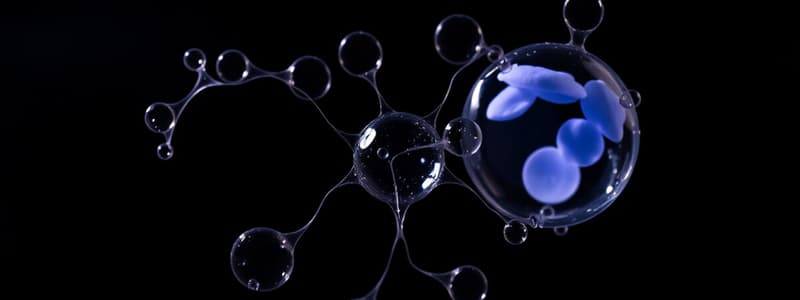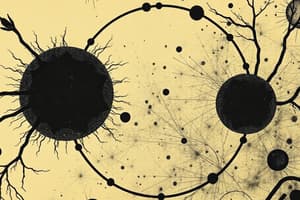Podcast
Questions and Answers
What is the role of the centriole in cell division?
What is the role of the centriole in cell division?
- It pinches the cell into two during cytokinesis.
- It stores the genetic material during division.
- It helps in the formation of the cell membrane.
- It aids in the formation of spindle fibers. (correct)
Which processes occur during interphase?
Which processes occur during interphase?
- Chromosomes condense to form chromatids.
- Only mitosis occurs.
- G1, S, and G2 phases take place. (correct)
- Cytokinesis is fully completed.
What distinguishes a haploid cell from a diploid cell?
What distinguishes a haploid cell from a diploid cell?
- Haploid cells have identical chromosomes.
- Diploid cells are only found in gametes.
- Diploid cells are formed by the fusion of two haploid cells. (correct)
- Haploid cells contain double the genetic material.
What happens during crossing over in meiosis?
What happens during crossing over in meiosis?
What characterizes benign tumors compared to malignant tumors?
What characterizes benign tumors compared to malignant tumors?
Flashcards
Binary Fission
Binary Fission
The process where a single-celled organism divides into two identical daughter cells.
Mitosis
Mitosis
The division of the nucleus in a eukaryotic cell, resulting in two identical daughter nuclei.
Stem Cells
Stem Cells
Cells that are not specialized, meaning they can develop into any type of cell.
Karyotype
Karyotype
Signup and view all the flashcards
Meiosis
Meiosis
Signup and view all the flashcards
Study Notes
Cell Reproduction
- Binary Fission: DNA pinches equally into two, creating two identical cells
- Cell Cycle: Consists of Interphase (G1, S, G2) and Mitosis, culminating in cell division
- Cytokinesis: The pinching off of the cell membrane, completing cell division
- Interphase: The longest stage, encompassing G1, S, and G2 phases of growth and DNA replication
- Mitosis: The process of nuclear division, producing two genetically identical nuclei
- Asexual Reproduction: Generates offspring genetically identical to the parent cell
- Centriole: An organelle crucial for spindle fiber formation during cell division
- Centromere: Region where sister chromatids attach
- Chromatin: Uncoiled DNA, found in the nucleus
- Chromosome: Tightly coiled DNA, easily visible during cell division
- Gametes: Reproductive cells (sperm and egg)
- Zygote: Resulting cell from fertilization
- Haploid: Cells containing half the normal chromosome number
- Diploid: Cells containing the full complement of chromosomes
- Homologous Chromosomes: Pairs of chromosomes carrying the same genes
- Crossing Over: Exchange of genetic material between homologous chromosomes, enhancing genetic diversity
- Meiosis: Cell division designed to reduce chromosome number, producing gametes
- Somatic Cells: Regular body cells (e.g., skin, muscle, bone)
Cell Cycle and Growth
- Vegetative Propagation: New plant growth from a part of the parent plant
- Cancer Cell Cycle Timing: Uncontrolled cell division
- Chromatid: Double-stranded structure of DNA
- Differentiation: Process where cells take on specialized functions
- Daughter Cells: Newly formed cells after cell division
- Benign: Non-cancerous cells; do not spread
- Malignant: Cancerous cells; can spread
- Tumor: Abnormal mass of cells
- Karyotype: Set of chromosomes arranged according to size and structure
- Nondisjunction: Failure of chromosomes to separate properly during meiosis, potentially causing genetic disorders
- Stem Cell: Undifferentiated cells capable of developing into specialized cells
- Budding: Asexual reproduction method of forming a new organism from an outgrowth or bud
Studying That Suits You
Use AI to generate personalized quizzes and flashcards to suit your learning preferences.






